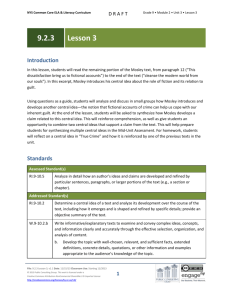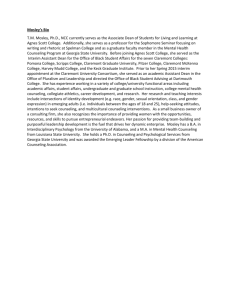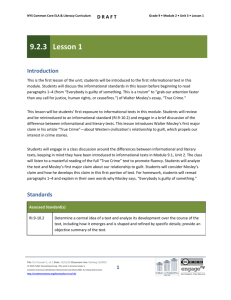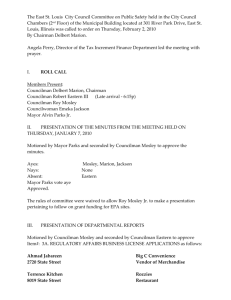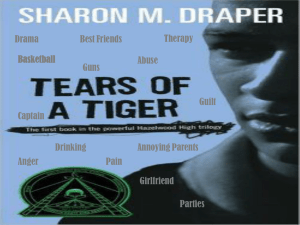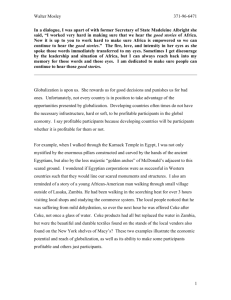True Crime Discussion Questions
advertisement
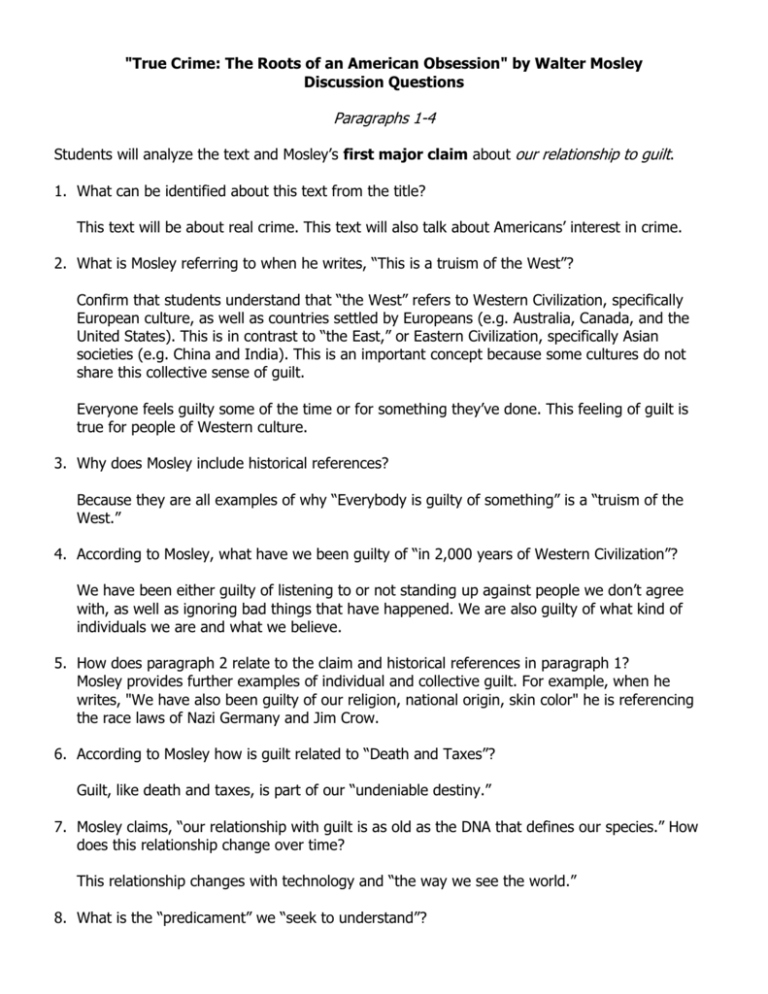
"True Crime: The Roots of an American Obsession" by Walter Mosley Discussion Questions Paragraphs 1-4 Students will analyze the text and Mosley’s first major claim about our relationship to guilt. 1. What can be identified about this text from the title? This text will be about real crime. This text will also talk about Americans’ interest in crime. 2. What is Mosley referring to when he writes, “This is a truism of the West”? Confirm that students understand that “the West” refers to Western Civilization, specifically European culture, as well as countries settled by Europeans (e.g. Australia, Canada, and the United States). This is in contrast to “the East,” or Eastern Civilization, specifically Asian societies (e.g. China and India). This is an important concept because some cultures do not share this collective sense of guilt. Everyone feels guilty some of the time or for something they’ve done. This feeling of guilt is true for people of Western culture. 3. Why does Mosley include historical references? Because they are all examples of why “Everybody is guilty of something” is a “truism of the West.” 4. According to Mosley, what have we been guilty of “in 2,000 years of Western Civilization”? We have been either guilty of listening to or not standing up against people we don’t agree with, as well as ignoring bad things that have happened. We are also guilty of what kind of individuals we are and what we believe. 5. How does paragraph 2 relate to the claim and historical references in paragraph 1? Mosley provides further examples of individual and collective guilt. For example, when he writes, "We have also been guilty of our religion, national origin, skin color" he is referencing the race laws of Nazi Germany and Jim Crow. 6. According to Mosley how is guilt related to “Death and Taxes”? Guilt, like death and taxes, is part of our “undeniable destiny.” 7. Mosley claims, “our relationship with guilt is as old as the DNA that defines our species.” How does this relationship change over time? This relationship changes with technology and “the way we see the world.” 8. What is the “predicament” we “seek to understand”? The “predicament” is our ever-present relationship to guilt. 9. How does Mosley develop a central idea in paragraphs 1–4? Mosley’s first sentence in this essay is, “Everybody is guilty of something.” This is an idea he develops in the first four paragraphs. He references historical acts that were wrong, as well as individual actions that perpetuate our relationship to guilt. Mosley continues to develop this idea of inescapable guilt by saying that guilt is part of our “undeniable destiny,” and “as old as the DNA that defines our species.” Mosley believes we are all guilty and have done things for which we are culpable, and this relationship with guilt is ingrained in everyone. Paragraphs 5-11 Mosley uses these paragraphs to develop his second central idea of vulnerability (and its relationship to guilt). 1. What is Mosley referring to by “This” when he writes, “This is because most of us see ourselves as powerless cogs in a greater machine”? “This” refers to Mosley’s preceding comment about our interest in “true-crime stories, murder mysteries,” etc. rather than an interest in “justice” and “human rights” 2. What images in paragraph 5 could help you determine the meaning of vulnerability in paragraph 6? What does vulnerability mean? The images of cogs in a machine, innocent bystanders, potential victims, caught in crossfire describe humans in a weak state. Vulnerability is “the state of being open to harm or attack.” 3. Why would someone “feel stupid for doing what they were taught was right”? How this does relate to our vulnerability? Someone would feel stupid for doing what they thought was right if that was going to get them killed, and Mosley is saying that we see this happen on TV so perhaps it could happen to us. This uncertainty makes us feel vulnerable, or unsafe. 4. Explain Mosley’s claim about life in “smaller societies.” What is different today? Mosley says that in smaller societies we “worked side by side with leaders” and had “face-toface meetings,” which “gave us at least the illusion of understanding where we stood and what was right.” He means that we used to get our information right from the actual people making decisions, but today, the “urban dweller” gets information from “TV and computer screens,” and the people in the news often “misinform.” 5. What does Mosley mean by “the illusion of understanding”? Mosley means that even if we didn’t understand “where we stood and what was right,” it felt like we did, because we had face-to-face contact. 6. What does Mosley mean by “the media misinform”? He is saying that no information we get is completely reliable. 7. Why might we distrust an “objective opinion source”? Because opinions cannot be objective—they are beliefs. 8. How does the author connect vulnerability to guilt in paragraphs 5–11? Mosley says that society, which often makes us feel guilty of things beyond our control, also makes us feel very vulnerable because we are so small and it is so big and “insensitive.” Mosley also asks if we would be “guilty of being stupid” if we turned someone in for murder. If we cannot trust what we “were taught was right” we feel exceptionally vulnerable. 9. What details does Mosley use to develop a central idea in paragraphs 5–11? Mosley defines a central idea of vulnerability in these paragraphs. He describes it as the feeling we all have that we are “potential victims” in a, “crossfire between the forces of so-called good and evil.” Mosley continues to develop this idea of vulnerability in society by questioning whether it is safe to do something as simple as “walk the streets” or “speak to an attractive stranger.” Another reason we feel vulnerable, according to Mosley, is that we do not understand why “the economy, and the world in general, [are] getting worse.” Paragraphs 12-16 Mosley introduces his central idea about the role of fiction and its relation to guilt. 1. According to Mosley, why do we turn to fiction for truth? Because of our “dissatisfaction” with other sources of information. 2. According to Mosley, what do fiction and entertainment provide for us? Fiction and entertainment “corroborate our feelings of distrust and allow us to think about” how we fit into the big, scary world. 3. What role do fictional “heroes” play for us in our lives, and how are they limited? Fictional “heroes” can’t let us down, and they allow us to “escape” into fantasy “where even a common everyday Joe (or Jane) can be saved.” But these heroes cannot help us “resolve our dilemmas in the real world.” 4. What does Mosley mean when he says dilemmas? Give an example of a dilemma from the text. He means our problems in the real world, like our search for truth and our distrust of news sources. 5. What does Mosley mean by salvation? He means being safe from harm or uncertainty; he means finding a hero who can save us from our problems, like the ones in fiction and entertainment. 6. What is the “machine that covers the world with its cold, gray shadow”? How does Mosley’s use of “cold, gray shadow” refine the central idea of vulnerability? The machine is society. The cold gray shadow refines the idea of vulnerability because it is so large, scary, and hopeless as it hangs over us and there is nothing we can do make it go away. 7. Why, according to Mosley, do “We need forgiveness and someone to blame”? Mosley says this will help us feel better about our inherent guilt and sin, our failures, and our fear of society. 8. How is guilt related to our fascination with real and fictional crime stories? Mosley says fiction gives us a fantasy world to which we can escape from the real world. In this fantasy there are blameless heroes who will never be compromised and villains whom we can blame completely. These characters give a clear view of the world and this serves to alleviate feelings of guilt and vulnerability. Modern life does not offer clear answers and this propels our fascination with real and fictional crime stories. 9. How do particular sentences in the text develop and refine Mosley's claim regarding what fiction can offer? Mosley introduces the claim that “fiction…can offer escape” by stating that through “Crime shows, mysteries, and films” we can alleviate our feelings of guilt and vulnerability. Mosley believes that fiction can validate our feelings because it presents situations where someone actually cares if an innocent bystander gets hurt. The figures who care about how vulnerable we are in these fictional accounts are “heroes who can’t let us down.” Mosley further refines this claim by stating that we can be “saved” through our escape through fiction as well as be “forgive[n]” for the “sinful desires” that feed our guilt. Mosley states plainly that “We need forgiveness and someone to blame,” and fiction offers us both.
